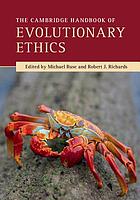
Reaction to Michael Vlerick's “Better Than Our Nature? Evolution and Moral Realism, Justification and Progress.”
Michael Vlerick's “Better Than Our Nature? Evolution and Moral Realism, Justification and Progress.”
in Ruse, Michael, and Robert J. Richards, eds. The Cambridge Handbook of Evolutionary Ethics. Cambridge, United Kingdom: Cambridge University Press, 2017. 9781107132955. Cambridge Handbooks in Philosophy. [via academia.edu]

Puts forward an “innate ‘moral compass’ ” or “ ‘moral sense’ ”as a way to allow an evolutionist to account for “ ‘moral progress’ ” (with the usual inclusion of “reason”.)
I guess this is most equivalent to my "moral urge" which I later de-escalate with a blur into "worlding" wherein we world our selves, and self our worlds together. But with compass or sense the paper finds its own railway track into the academic world of its own. As it should.
Focuses on 'co-operation in groups' as morality’s evolutionary framework. This may well be the case, but it is an indirect outcome even if directly selected for, vicariously through the ability of a group to successfully raise children.
Indirect outcomes imply indirect selection for which there is a high bar. Examples of human complexity or confounding behaviours do not get us over this bar.
Even ‘co-operation’ in the weakest sense of ‘co-ordination’ is too much for for this evolutionary process to select for. (We are not in competition with gods, even if we let kingly narcissists get away with murder.)
The article raises issues (as evidence for their position) about how some moral-based behaviour leads to non-reproductive fitness for individuals in regard to otherwise ‘fitness enhancing behaviours’ that a moral compass would allow for. But this is stretching the bow too far. The 'moral urge' merely needs to get us more organised than those who are then less organised, moral co-operation may be an outcome, but is not selected for when the moral urge is an advantage in itself. (When we make mistakes we learn and adapt, if we just sit there we do not.) Any weirdness that economies of scale subsequently allow prove this exact point of these pathway potentials.
The creation of a world, the world, is not a clear outcome, but it is an outcome _and_ it is a very woolly concept. My meta-ethical position says that 'morality' and meta-morality are some of many outcomes of the same urge that allow us to world. That this is a mess if none too surprising if we realise it is an outcome of evolutionary forces on complexified and complexifying animal umwelten arriving out of apish egalitarian overthrow of primate hierarchies. (See my essay written about 8 years ago).
“The mere fact that we recognize these transcending behaviors as morally laudable is proof that our moral sense has come a long way from its evolutionary origin.” (page 3)
No. Actually it is the complete opposite and is evidence that evolution has not supplied us with an organ for truth and that is is all a complete mess, but we get on with organising a world in and out of the mess, in any case.
And then the article throws reason into the gap thus created, or should I say organised… or —shoulded into place. The urge to should and get stuff organised is strong in all of us.
A list of reactions to more evolution~morality papers and chapters and stuff can be found at Reactions to papers on evolution~morality.
